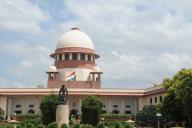New Delhi– The Supreme Court on Friday said it will hear on December 2 the challenge to the constitutional validity of the Centre’s November 8 decision to demonetise high-denomination currency notes which resulted in public inconvenience.
A bench of Chief Justice T.S. Thakur and Justice D.Y. Chandrachud initially said it will first hold a hearing on the inconvenience faced by the public and the steps taken to redress the issue.
Seeking to know the ground reality, the court said hearing on the validity of the note ban could take place later.
“You tell us what is the situation on the ground and what needs to be done,” the bench asked as senior counsel Kapil Sibal, appearing for one of the petitioners, insisted for hearing on the validity of the Centre’s decision also.
 The apex court later agreed to hold the hearing on both aspects as Sibal urged for preliminary hearing either on Tuesday (November 29) or Thursday (December 1) on the validity of the demonetisation decision.
The apex court later agreed to hold the hearing on both aspects as Sibal urged for preliminary hearing either on Tuesday (November 29) or Thursday (December 1) on the validity of the demonetisation decision.
However, Attorney General Mukul Rohatgi said the petitions presently before the apex court should be heard along with other pleas, which the Centre seeks to get transferred either to the apex court or the Delhi High Court.
“Have it on Friday (December 2), so that everybody can be heard. There can’t be piecemeal hearing (of the matter),” Rohatgi told the bench.
The court has listed for December 2 the hearing on the Centre’s plea for the transfer of all the cases filed before different high courts or subordinate courts to challenge the demonetisation of Rs 500 and Rs 1,000 bank notes.
Referring to the government reply filed on Thursday, Rohatgi told the court that the Centre has placed everything on the affidavit.
Assailing the government decision that put a limit on withdrawals by bank account holders, Sibal asked under what provisions of law a depositor can be restricted from withdrawing his own money.
He said people are starving on the streets, markets are closed, and there is no cash.
The Attorney General countered it by saying no one was starving on the streets.
Telling the court that he was ready with statistics from the government and the Reserve Bank of India, Sibal said the government does not have the capacity to print new currency notes.
Sibal said Section 26 of the Reserve Bank of India Act, 1934, does not give the government the power to curtail the people’s right to withdraw their own money.
Lawyer Manohar Lal Sharma, who has filed public interest litigations in the past, described the demonetisation decision as a “conspiracy” and “corruption”, alleging insider dealings in the process.
Sharma told the apex court that the demonetisation decision had brought sufferings to the ordinary people while leaders of both the ruling and opposition parties escaped unscathed.
During the hearing, when several lawyers started speaking simultaneously at one point of time, Chief Justice Thakur said: “This is a courtroom. There is some decorum to be observed. We will adjourn the three cases for hearing after (winter) vacations.” (IANS)






